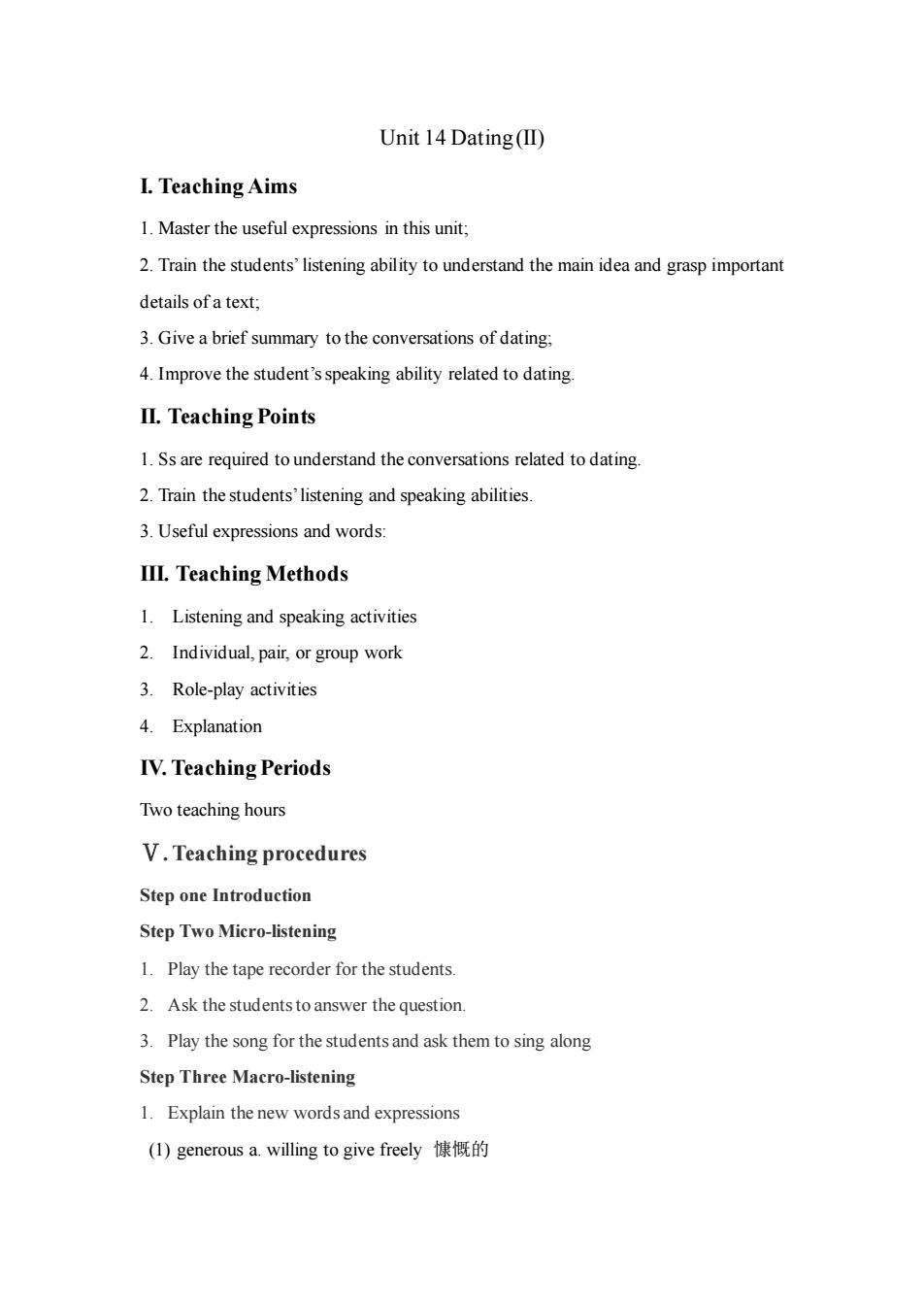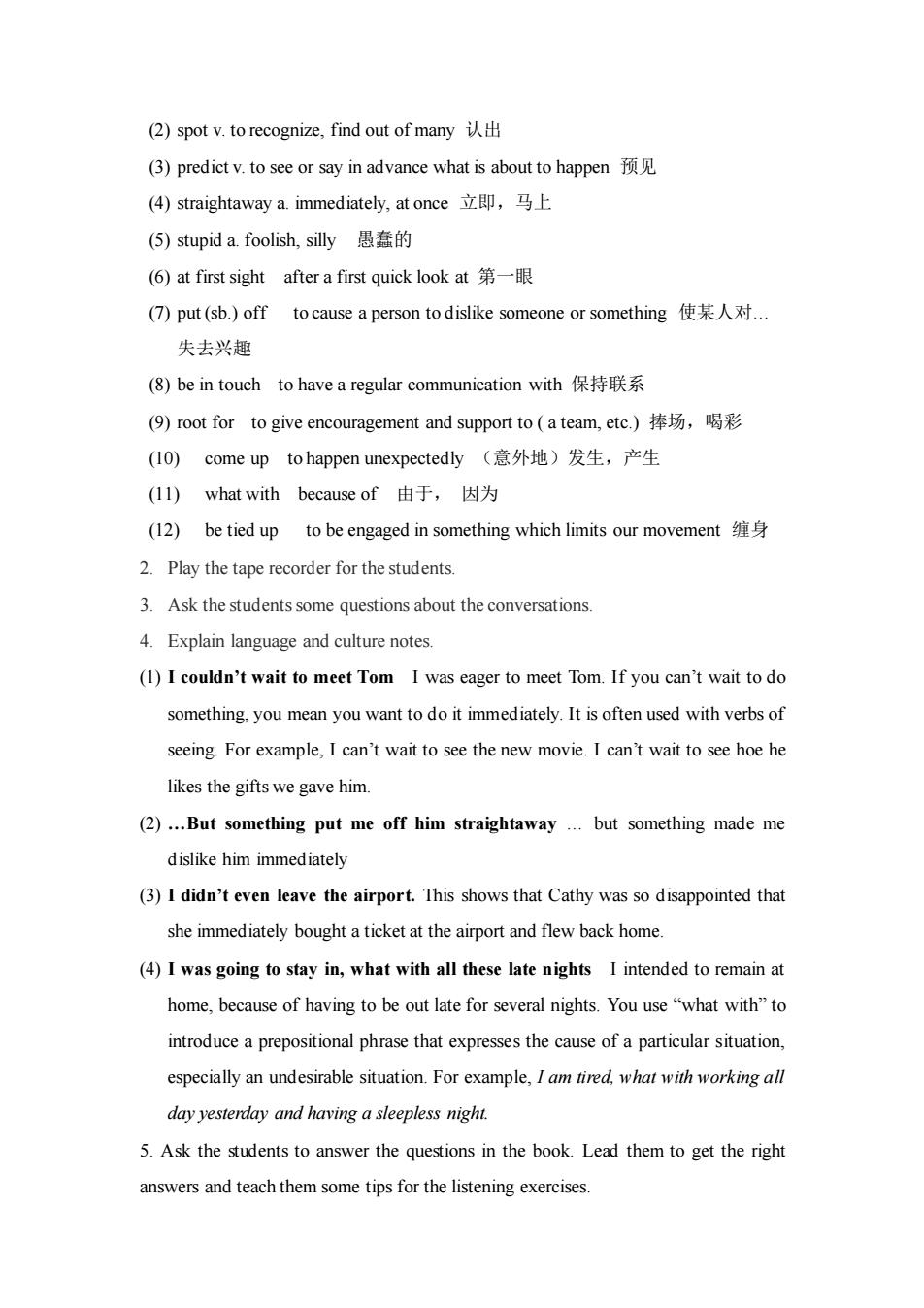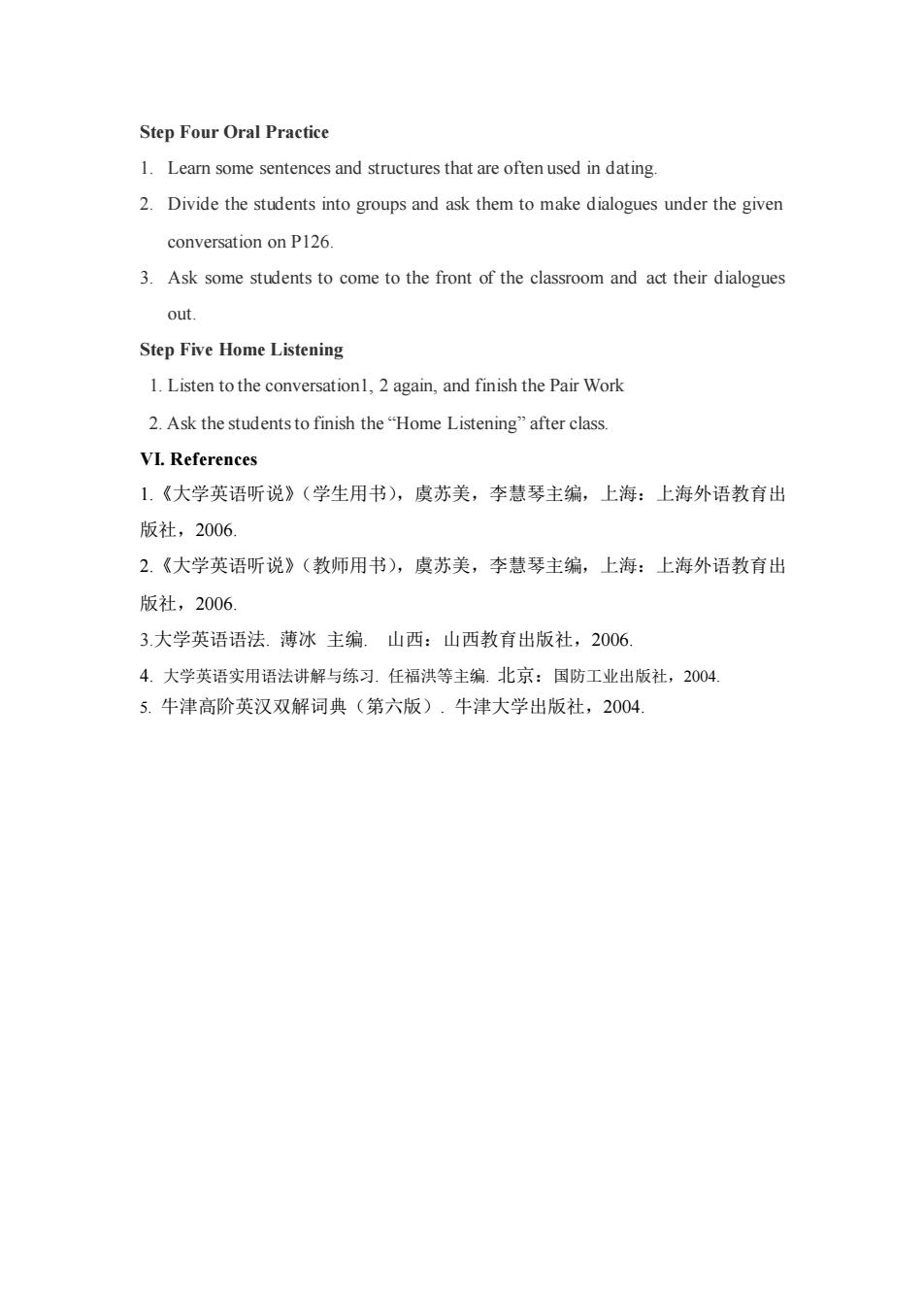
Unit 14 Dating(II) I.Teaching Aims 1.Master the useful expressions in this unit; 2.Train the students'listening ability to understand the main idea and grasp imporant details ofa text: 3.Give a brief summary to the conversations of dating; 4.Improve the student's speaking ability related to dating. II.Teaching Points 1.Ss are required to understand the conversations related to dating 2.Train the students'listening and speaking abilities 3.Useful expressions and words: III.Teaching Methods 1.Listening and speaking activities 2.Individual,pair,or group work 3.Role-play activities 4.Explanation IV.Teaching Periods Two teaching hours V.Teaching procedures Step one Introduction Step Two Micro-listening 1.Play the tape recorder for the students 2.Ask the studentsto answer the question 3.Play the song for the studentsand ask them to sing along Step Three Macro-listening 1.Explain the new words and expressions (l)generous a.willing to give freely慷概的
Unit 14 Dating (II) I. Teaching Aims 1. Master the useful expressions in this unit; 2. Train the students’ listening ability to understand the main idea and grasp important details of a text; 3. Give a brief summary to the conversations of dating; 4. Improve the student’s speaking ability related to dating. II. Teaching Points 1. Ss are required to understand the conversations related to dating. 2. Train the students’ listening and speaking abilities. 3. Useful expressions and words: III. Teaching Methods 1. Listening and speaking activities 2. Individual, pair, or group work 3. Role-play activities 4. Explanation IV. Teaching Periods Two teaching hours Ⅴ. Teaching procedures Step one Introduction Step Two Micro-listening 1. Play the tape recorder for the students. 2. Ask the students to answer the question. 3. Play the song for the students and ask them to sing along Step Three Macro-listening 1. Explain the new words and expressions (1) generous a. willing to give freely 慷慨的

(2)spot v..to recognize,find out of many认t出 (3)predict v.to see or say in advance what is about to happen (4)straightaway a.immediately,at once立即,马上 (⑤)stupid a.foolish,sily愚蠢的 (6)at first sight after a first quick look at第一眼 (7)put(sb.)off to cause a person to dislike someone or something使某人对. 失去兴趣 (8)be in touch to have a regular communication with保持联系 (9)root for to give encouragement and support to(a team,etc,)捧场,喝彩 (O)come up tohappen unexpectedly(意外地)发生,产生 (I)what with because of由于,因为 (12)be tied up to be engaged in something which limits our movement 2.Play the tape recorder for the students. 3.Ask the students some questions about the conversations 4.Explain language and culture notes. (1)I couldn't wait to meet Tom I was eager to meet Tom.If you can't wait to do something,you mean you want to do it immediately.It is often used with verbs of seeing.For example,I can't wait to see the new movie.I can't wait to see hoe he likes the gifts we gave him. (2)..But something put me off him straightaway.but something made me dislike him immediately (3)I didn't even leave the airport.This shows that Cathy was so disappointed that she immediately bought a ticket at the airport and flew back home. (4)I was going to stay in,what with all these late nights I intended to remain at home,because of having to be out late for several nights.You use"what with"to introduce a prepositional phrase that expresses the cause of a particular situation, especially an undesirable situation.For example,I am tired.what with working all day yesterday and having a sleepless night. 5.Ask the students to answer the questions in the book.Lead them to get the right answers and teach them some tips for the listening exercises
(2) spot v. to recognize, find out of many 认出 (3) predict v. to see or say in advance what is about to happen 预见 (4) straightaway a. immediately, at once 立即,马上 (5) stupid a. foolish, silly 愚蠢的 (6) at first sight after a first quick look at 第一眼 (7) put (sb.) off to cause a person to dislike someone or something 使某人对… 失去兴趣 (8) be in touch to have a regular communication with 保持联系 (9) root for to give encouragement and support to ( a team, etc.) 捧场,喝彩 (10) come up to happen unexpectedly (意外地)发生,产生 (11) what with because of 由于, 因为 (12) be tied up to be engaged in something which limits our movement 缠身 2. Play the tape recorder for the students. 3. Ask the students some questions about the conversations. 4. Explain language and culture notes. (1) I couldn’t wait to meet Tom I was eager to meet Tom. If you can’t wait to do something, you mean you want to do it immediately. It is often used with verbs of seeing. For example, I can’t wait to see the new movie. I can’t wait to see hoe he likes the gifts we gave him. (2) …But something put me off him straightaway … but something made me dislike him immediately (3) I didn’t even leave the airport. This shows that Cathy was so disappointed that she immediately bought a ticket at the airport and flew back home. (4) I was going to stay in, what with all these late nights I intended to remain at home, because of having to be out late for several nights. You use “what with” to introduce a prepositional phrase that expresses the cause of a particular situation, especially an undesirable situation. For example, I am tired, what with working all day yesterday and having a sleepless night. 5. Ask the students to answer the questions in the book. Lead them to get the right answers and teach them some tips for the listening exercises

Step Four Oral Practice 1.Learn some sentences and structures that are often used in dating. 2.Divide the students into groups and ask them to make dialogues under the given conversation on P126. 3.Ask some students to come to the front of the classroom and act their dialogues out. Step Five Home Listening 1.Listen to the conversationl,2 again,and finish the Pair Work 2.Ask the students to finish the"Home Listening"after class. VI.References 1.《大学英语听说》(学生用书),虞苏美,李慧琴主编,上海:上海外语教育出 版社,2006. 2.《大学英语听说》(教师用书),虞苏美,李慧琴主编,上海:上海外语教有出 版社,2006. 3.大学英语语法.薄冰主编.山西:山西教育出版社,2006 4.大学英语实用语法讲解与练习.任福洪等主编。北京:国防工业出版社,2004, 5.牛津高阶英汉双解词典(第六版),牛津大学出版社,2004
Step Four Oral Practice 1. Learn some sentences and structures that are often used in dating. 2. Divide the students into groups and ask them to make dialogues under the given conversation on P126. 3. Ask some students to come to the front of the classroom and act their dialogues out. Step Five Home Listening 1. Listen to the conversation1, 2 again, and finish the Pair Work 2. Ask the students to finish the “Home Listening” after class. VI. References 1.《大学英语听说》(学生用书),虞苏美,李慧琴主编,上海:上海外语教育出 版社,2006. 2.《大学英语听说》(教师用书),虞苏美,李慧琴主编,上海:上海外语教育出 版社,2006. 3.大学英语语法. 薄冰 主编. 山西:山西教育出版社,2006. 4. 大学英语实用语法讲解与练习. 任福洪等主编. 北京:国防工业出版社,2004. 5. 牛津高阶英汉双解词典(第六版). 牛津大学出版社,2004